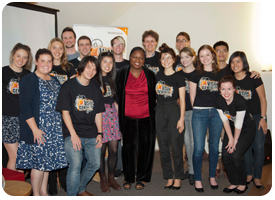“UN Rapporteur on Trafficking in Persons visits youth activists”
January 13
The UN Special Rapporteur on Trafficking in Persons met with youth activists in Melbourne, Australia, last month and praised them for their campaign work. The visit comes ahead of the publication of a highly anticipated report on government anti-trafficking efforts, writes Steph Carter, 21, a Commonwealth Correspondent from Brisbane.
For young members of World Vision Australia’s national youth movement Vision Generation, meeting Dr Joy Ezeilo was the satisfying end to what has been a busy year.
For these youth activists who have spent the best part of 2011 working on World Vision’s anti-trafficking ‘Don’t Trade Lives’ campaign, a hand-shake and a quick word with the United Nations Special Rapporteur on Trafficking in Persons was a rare and welcome opportunity.
As the next stop on Dr Ezeilo’s worldwide fact finding tour, Australia was under the microscope on all matters human trafficking. Examining Australia’s current strategies to combat trafficking in persons, Dr Ezeilo’s visit culminated in a suite of recommendations being made to the Australian Government. These recommendations, which target Australia’s current efforts to combat the causes and effects of human trafficking and modern day slavery, form the basis of an independent report that will be delivered back to the United Nations Human Rights Commission in 2012.
Taking time out from a schedule packed with official government meetings, Dr Ezeilo attended the conference hosted by Vision Generation at Melbourne University, to address her most attentive audience yet. Speaking frankly to the attending students, she praised them for their anti-trafficking campaigning efforts and highlighted the need for more young people to become involved in countries around the world. This includes both transit and destination countries for trafficking in persons.
 Said one Vision Generation volunteer: ‘Meeting Dr Ezeilo was a real honour, and very interesting. Her passion for trafficking in persons, particularly as it affects women and children, is inspiring. Hearing her encourage us to keep speaking out about human trafficking and modern day slavery gives me hope that what we are doing is making some kind of difference’.
Said one Vision Generation volunteer: ‘Meeting Dr Ezeilo was a real honour, and very interesting. Her passion for trafficking in persons, particularly as it affects women and children, is inspiring. Hearing her encourage us to keep speaking out about human trafficking and modern day slavery gives me hope that what we are doing is making some kind of difference’.
World Vision’s ‘Don’t Trade Lives’ campaign, supported heavily by Vision Generation activists, began in 2008 and aims to examine the issue of labour exploitation and human trafficking in the Asia and West Africa region. In addition, it looks at how trafficking and slavery relates to consumer behaviour and purchase demand in countries like Australia. Labelled as the modern day slave trade, young people are increasingly joining the fight to combat human trafficking.
At the close of her Australian visit, Dr Ezeilo outlined some key recommendations, one of those being the need to move away from over-sexualising the discourse of trafficking, and focus on both labour exploitation and prostitution as dominant forms of human trafficking. She also recommended that Australia provide specialist services to child trafficking victims. As a destination country, it is apparent that Australia can still do more to combat what has become the third largest transnational organised crime in the world.
While the efforts of those such as William Wilberforce may have ended one historical era of slavery, a new and certainly more complex one remains. As the door closes on 2011, NGO and human rights groups alike will be watching to see what recommendations Australia chooses to take on board in 2012.
…………………………………………………………………………………………………………………
About me:
“I’m a student based in Brisbane, Australia. I am currently in my final year of undergraduate study at the University of Queensland, studying Development, Journalism and International Relations and will be commencing a Masters of International Studies in 2012.
“Aside from my study commitments, I lead a hectic life! I’m passionate about aid and development and am involved with World Vision Australia’s national youth movement ‘Vision Generation’. I also work part time in the travel industry (which might explain my love of travel) and when I have spare time, you can find me playing my piano.”
…………………………………………………………………………………………………………………
Opinions expressed in this article are those of the author and do not necessarily represent the views of the Commonwealth Youth Programme. Articles are published in a spirit of dialogue, respect and understanding. If you disagree, why not submit a response?
To learn more about becoming a Commonwealth Correspondent please visit: http://www.yourcommonwealth.org/submit-articles/commonwealthcorrespondents/
…………………………………………………………………………………………………………………



